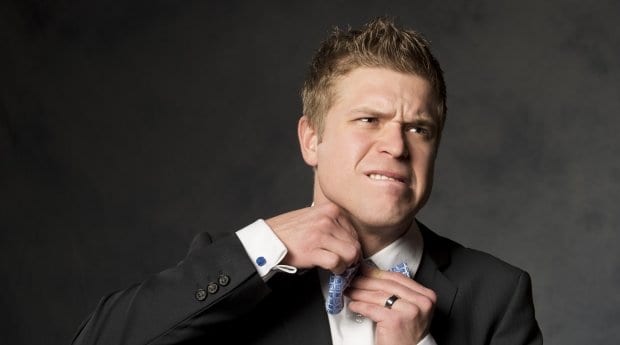Whenever she was asked to define German cabaret, singer Claire Waldoff explained that the form strikes a balance between entertainment, politics and sex, and — at least according to cabaret scholar Peter Jelavich — sex always had the edge.
Waldoff is only one of the queer-historical references that are granted glorious new life in Peter Hinton’s reinvigoration of Kander and Ebb’s Cabaret, currently onstage at the Shaw Festival in Niagara-on-the-Lake. Hinton’s production exemplifies Waldoff’s criterion in glorious style: look closely and you will also see a lesbian Kit Kat boy inspired by androgynous poet and journalist Sylvia von Harden — made famous in a portrait by painter Otto Dix — and a transsexual Kit Kat girl channelling the spirit of Cocteau muse and American drag circus-star Barbette.
The Berlin of the early 1930s that provides the setting for Cabaret has gained legendary status in queer circles, and it’s easy to see why. With the introduction of the democratic Weimar Republic following the disaster of the First World War, all aspects of life in Berlin were transfigured, and soon Berlin replaced Paris as the centre of modernity in Europe. Germany’s pre-war censorship laws were struck down, and artists flocked into the city for many of the same reasons that contemporary creatives still feel Berlin’s gravitational pull: a low cost of living combined with a spirit of experimentation and the opportunity for great sex.
Although figures vary, it is estimated that 120,000 female sex workers plied their trade on Berlin’s streets during the Republic, along with another 45,000 rent boys catering to all possible kinks. Though Christopher Isherwood — whose Berlin Stories inspired the musical Cabaret — dismissed the romantic ideal of “decadent Berlin,” it is undeniable that the city was aflame with sex; conservatives even spoke of the “Berliner Luft,” claiming that the air itself served as an intoxicant that drove Berliners to all manner of sexual perversions. As the party raged on at Berlin’s hundred-plus queer bars and clubs, Hitler’s Nazi party battled with the Communists and Social Democrats in the parliamentary elections, leading to a Nazi seizure of power in January of 1933.
For Kyle Golemba — who plays the role of gay Kit Kat boy Bobby — performing in Cabaret allowed him his first opportunity to portray a gay character onstage. Golemba — a native of Regina — began his musical theatre training with a youth company that also included fellow Shaw regular Jeff Irving and future Broadway star Paul Nolan. Golemba relocated to Toronto at age 18 to train at the prestigious musical theatre program at Sheridan College in Oakville before performing in five seasons at the Stratford Festival and is now in his second season at the Shaw.
Playing Bobby exposed Golemba to the often hidden history of the persecution of gay men under the Third Reich. Marked in the camps by a pink triangle, gay men were among the first groups to be sent to Nazi concentration camps for the “crime” of posing a threat to the propagation of the German race — in a typical example of twisted Nazi logic, lesbianism was never officially outlawed because queer women could still be used to procreate for the Reich. Because the scholarship is so scant, it is impossible to arrive at definitive numbers of gay men murdered by the Nazis, but accepted estimates range from 10,000 to 15,000 victims.
“I knew about the pink triangle,” Golemba explains, “but what I’ve come to love about doing theatre is that every show I do, I end up learning something.” In preparation for rehearsals, Golemba pored over the memoirs of gay men who survived the concentration camps and studied the sociopolitical history of the Weimar period and the Third Reich.
Golemba was also excited by his visionary director and his scene partner Kelly Wong, who plays Victor, the other half of the Kit Kat Klub’s gay double act. “The great thing about Kelly,” Golemba says, “is that he was so on-board right from the get-go.” Wong — who is straight — was equally invested in exploring Cabaret’s queer aspects. “We are having a great time together” Golemba says.
For Golemba, the act of representing not only the defiant sexual liberation of the Weimar period, but also the horrors of Nazi terror are not taken lightly. “The arc of what we’re telling is really demanding and difficult and requires a level of respect and a level of energy,” he explains. “It really marks a journey of what everyone lost.”
Cabaret runs until Sun, Oct 26 at the Shaw Festival Theatre, 10 Queen’s Parade, Niagara-on-the Lake.
shawfest.com/playbill/cabaret/story

 Why you can trust Xtra
Why you can trust Xtra


